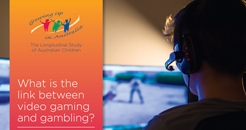 What is the link between video gaming and gambling?
What is the link between video gaming and gambling?
From a report by the Australian Institute of Family Studies
Video gaming is a popular form of entertainment in Australia. At age 12-13 years, almost all participants in a longitudinal study of Australian children (96% males; 90% females) reported playing video games, and 53% of males and 36% of females played almost every day. Participation in video gaming and daily video gaming declined as adolescents transitioned through their teenage years.
Gaming and gambling are defined as separate activities but they share similarities in appearance, interactive features and elements of skill and chance. Games that structurally resemble traditional gambling activities ('gambling-like' video games) are commonly referred to as 'simulated gambling'. Simulated gambling appears in many forms in video games but social casino games are the most common. At age 16-17 years, one in five (20%) adolescents in the study played simulated gambling games (e.g. Zynga Poker, Slotomania and Big Fish Casino). Engagement with simulated gambling games was more common among boys (24%) than girls (15%).
Previous research has found a link between video gaming and gambling. Simulated gambling products have the potential to normalise and encourage monetary gambling, especially among children and young people, yet few studies have examined this relationship. Gambling can lead to a range of negative consequences or gambling harms, including financial, relationship, social, health and emotional/psychological harms.
Researchers in the longitudinal study examined the link between playing video games during adolescence and gambling as a young adult. They explored whether young people who played video games frequently or played certain types of games in their adolescent years started real money gambling when they reached the legal age for gambling in Australia (18 years).
They examined three main questions:
-
What are the effects of daily video gaming on real money gambling?
-
What are the effects of playing simulated gambling games on real money gambling?
-
What are the other main risk factors associated with gambling among young people?
The key findings are:
-
Young people who played video games daily during adolescence (aged 16-17 years) were not necessarily more likely to gamble as young adults (aged 18-19 years), but they found a link between playing simulated gambling games (such as Zynga Poker, Slotomania and Big Fish Casino) and real money gambling.
-
Young people who played simulated gambling games during adolescence (aged 16-17) had a 40 percentage points higher probability of spending real money on gambling as young adults (aged 18-19). By product, they found a higher probability of 29 percentage points for betting on horse or dog racing, of 26 percentage points for gambling on casino table games, and of 21 percentage points for betting on sports as young adults.
-
Parent gambling and higher levels of alcohol consumption were also found to be risk factors for young adults' gambling. Simulated gambling games appear to have more effect on young men than young women.
-
At 16-17 years (under-age), 2% of young Australians were classified as being at risk of, or already experiencing, gambling-related problems. Two years later at age 18-19 years, 9% were classified as at risk of, or already experiencing, gambling-related problems.
Video games that simulate gambling experience are often classified M (mature), but parents in Australia have called for tougher classifications e.g. R 18+. A review of Australian classification regulations recommended that the classification scheme be updated.
Read the full report here.
In the UK, ratings are produced by the Video Standards Council. These PEGI ratings can be found on game adverts and packaging. Zynga Poker, Slotomania, Big Fish Casino are rated as PEGI 18 on the App store or Google Playstore but can be accessed by anyone. As they are 'simulations', there are no affordability checks. They should at least be forced to verify age of person downloading.
Retweet about this article:
From a report by the Australian Institute of Famil, 22/03/2023